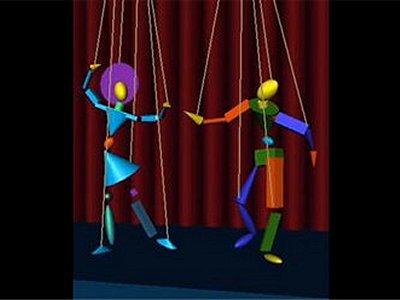CONTROLLING BEHAVIOUR
Rapid changes to the world make us insecure and less likely to let go of our grip to let God take a hold.
Hello, hello, I’m at a place called vertigo
It’s everything I wish I didn’t know…
The words to one of U2’s biggest hits create the feeling of a life out of control, like being behind the wheel of a car which is travelling too fast; the vertiginous sense of a world which we cannot possess because of the nausea that overcomes us instead.
We try, of course. One way this manifests itself is in controlling behaviour. When our environment is stable, we usually exercise a light touch; when lots of things are changing, we pay more attention - indeed, we are often told to get a grip. The unusual speed of change today – social, economic, cultural, technological – leaves many of us bewildered and so we try and control ever more firmly what lies within our grasp. Perhaps this is why we hear regularly today about controlling behaviour.
At its most insidious, this is the kind of malign influence which one person seeks to exercise over another as a way of bullying them into submission. There may be a threat of violence, or from the more peaceable, passive aggressive moods which direct the other person like strings on a puppet. Relationships which look ostensibly to others to be warm and supportive are in reality poor and dysfunctional.
Most of us would not wish to be so defined, but we still find ourselves trying to control our environment in ways which allow little room for the unexpected and may inhibit the freedom of others. The response we make to the insecurity we feel is to control ever more rigidly the things which lie within our power and thereby to give people the impression we are on top of everything.
In Galatians 2, the Apostle Paul says:
I have been crucified with Christ and it is no longer I who live, but it is Christ who lives in me. And the life I now live in the flesh I live by faith in the Son of God, who loved me and gave himself for me.
Paul himself was an excessively controlling person, driven by a strong sense of religious rightness. Unable to let the new Christian sect run its course in the way Gamaliel suggested in Acts 5 - that if it was not of God it would wither and die and if it was of God nothing could stop it - Paul took control of God and did his work for him. The subsequent conversion on the way to Syria was profoundly shocking, more or less taking away Paul’s room for manoeuvre. The revelation was so complete that Paul had no option than to turn his life upside down. He went into psychological shock for three days, such was the force he encountered. Perhaps this was the only way Paul could be stopped in his tracks, but it made him the ideal theologian to interpret the cross and its work in the life of a disciple of Christ.
Paul went to the cross in his conversion; his options were as limited as a man nailed by crucifixion. All the choices he made and aspirations he held died a death in that moment and much of what he had accomplished was made to look foolish and vindictive. But this was not the end of his story, merely the painful surrender to a greater will which Jesus himself had submitted to as he was crucified: not my will but yours be done.
It is perhaps only at occasional moments in our life when we experience something of this complete surrender, where we are broken by God. It makes us reluctant to sing so casually the chorus line ‘break me, melt me, mould me, fill me’ for we can barely get the first word out, such is its depth and power. Mostly we learn to die to sin on a more prosaic daily basis, to aim to put God’s will and purpose at the heart of our experience. Or at least we would if the addiction to controlling every aspect of our life and surroundings were not so deeply embedded in our instinct.
Believing God’s love is at the heart of his interest in us is the key to prising loose our grip on it all. As the song Vertigo ends:
All I know
Is that you give me something…
I can feel your love teaching me how
Your love is teaching me how to kneel, kneel
POPULAR ARTICLES

Obama's Covert Wars
The use of drones is going to change warfare out of all recognition in the next decades.

Through A Glass Starkly
Images of traumatic incidents caught on mobile phone can be put to remarkable effect.

What Are British Values?
Is there a British identity and if so, what has shaped the values and institutions that form it?



